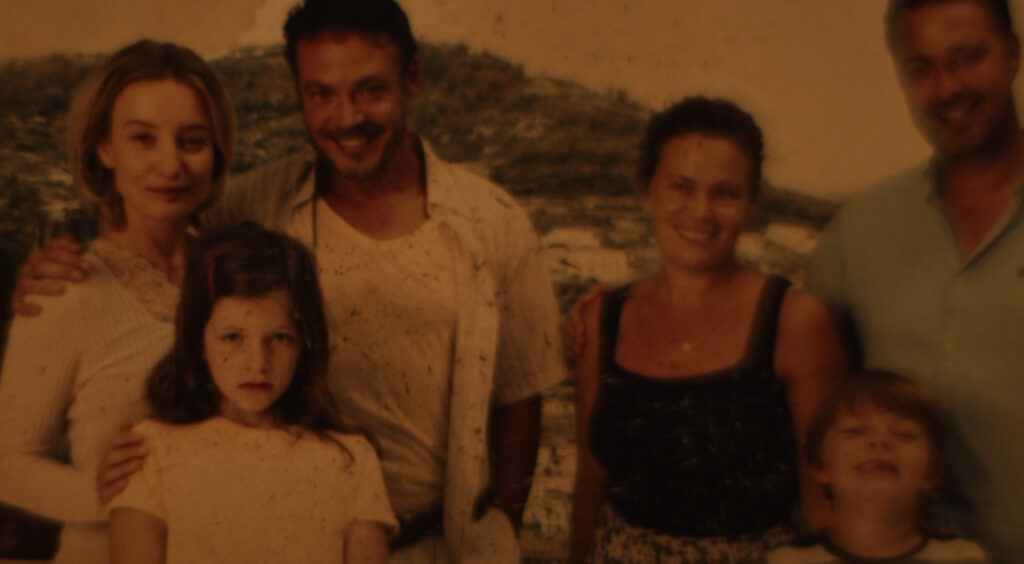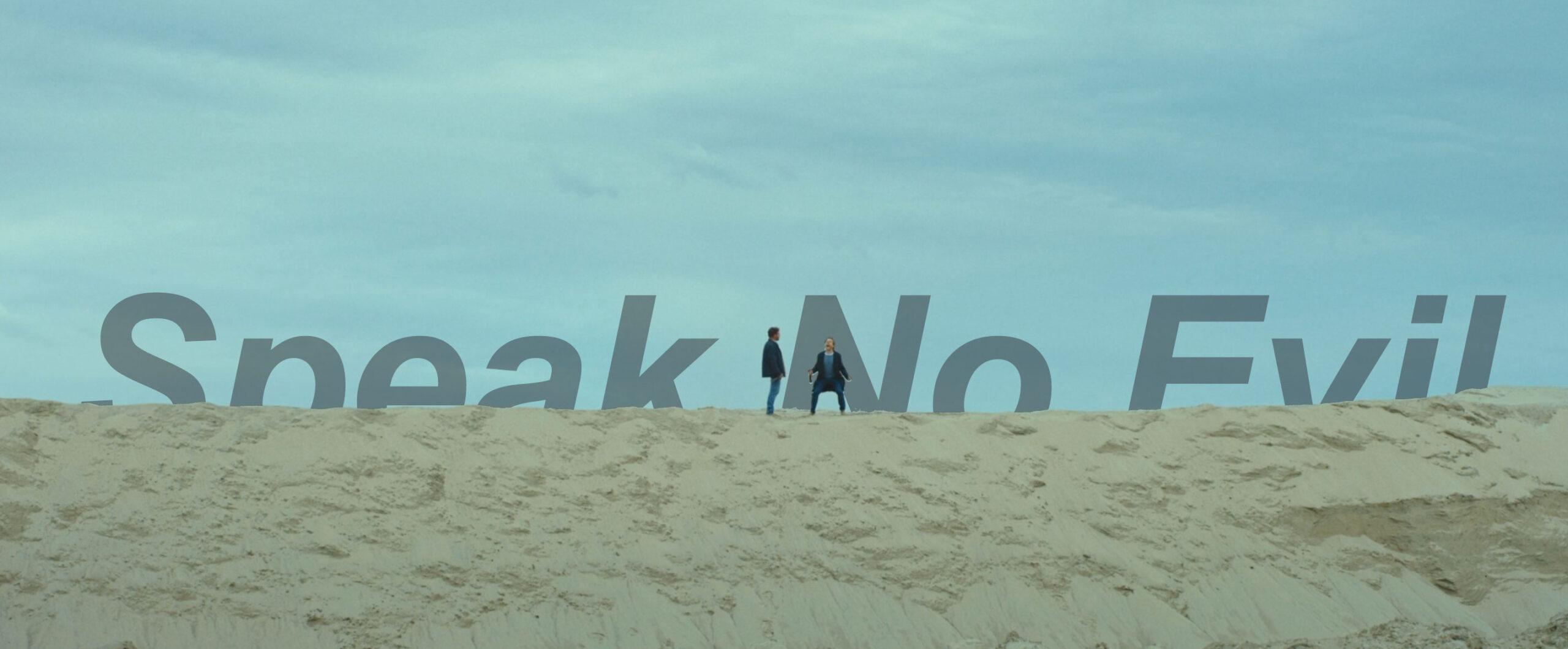Speak No Evil is a Moral Deconstruction on Social Obligation in the Extreme. I have to say that this movie isn’t for everyone. It’s hard to watch. It’s intense. And way more scary than your average, everyday, horror film. Why? Because the film, co-written and directed by Christian Tafdrup (who you might know from A Horrible Woman) pushes an idea about the sin of allowing yourself to be socially obliged upon so far as to break with sanity. It is a horribly disturbing film, all in service with making a very clear, and very concise point. And make its point it does… and how.
Soooo – warning – this film is not for the light of heart. More so – if you prefer happy endings, you might want to pass on this one. But, if you are here, after having just watched this gem of a movie (he says without a hint of sarcasm) and you are trying to understand what you just watched? Then I say we unpack this movie together, alright?
The first thing you have to understand about Speak No Evil is that it is a modern day morality play. You know, back in medieval Europe when a wagon pulled up to your town and put on a play detailing out the horrors of sloth? Remember those? Or that one traveling troupe that put on that stellar play on the societal dangers of stealing?
Speak No Evil is a Moral Deconstruction on Social Obligation in the Extreme
I don’t plan to do a super deep dive here – solely, because my soul probably wouldn’t take the effort. But, real quick, so that we are all on the same page here, let’s cover the basics. Bjørn and Louise, are from Denmark, having a vacation with their lovely daughter Agnes in Italy. Enter Patrick and Karin, a Dutch couple that are also there in Tuscany, also vacationing. They have a son, super great kid, but, no tongue, so a little difficult to talk to. Cough. Regardless, all six become fast friends, and Karin and Patrick invite the trio to their home in the Netherlands. After some thought… you know, HECK, why not? They go. I mean, they are sort of obliged to go, aren’t they? Worst, decision ever.
As the family’s reunite, things quickly go a little sideways. Patrick actually isn’t a doctor – he lied because he sometimes feels awkward in social situations. Karin and Patrick quickly start taking advantage of Bjørn and Louise’s good graces. Like for example, Patrick leaves Bjørn holding the bill for their dinner when it had been insisted by Patrick that he had to show them his favorite place to eat. Further and further the “confusions” get, and further and further downstream Bjørn and Louise get swept away. More than once Louise decides it’s time to leave, to run for it, but more than once her hosts flipped it back on her (“so the bed is too small, and uncomfortable… we aren’t rich like you… but we mean well!” sort of thing.).
Could it be that Patrick and Karin are socially awkward? Could it be that it’s a difference in cultures and social expectations? Are they just misunderstanding each other? Or, could it be that something else more evil, and horrible is going on under the surface? (Hint, it’s much, much, more sinister than a few minor social or cultural misunderstandings.) When Patrick begins to sense that something really horrible is going on, he heads over to a side building, and finds photos of families, and he notices that the children are changing from photo to photo.

Regardless, Bjørn, after seeing piles of suitcases, cameras, and the photos, he then discovered Patrick and Karin’s son floating face down in the pool. Dead. After that, Bjørn gets his wife, and daughter and they run for it. But eventually the car gets stuck (or did it run out of gas). Patrick and Karin cut Agnes tongue out, as her parents go completely nuts. They then haul her away, and cart the parents out to a quarry, where they then stone the parents to death. The end.
Speak No Evil is a Moral Deconstruction on Social Obligation in the Extreme
Now, what just happened?? And why do I believe that Speak No Evil is a moral deconstruction on social obligation in the extreme? The short answer is because this movie makes literally no sense whatsoever from a literal standpoint. I mean, sure, I guess there could be a couple obliging others and cutting out their children’s tongues, and murdering their parents. I suppose? But it makes infinitely more sense to realize that this movie is a commentary on our social mores and standards. The movie is bringing up the sin of social obligations – and the impacts that they can unwittingly (or very wittingly) have on you, your family and extended circles.
Wait. Let’s slow down a second.
Collectivism: “The practice or principle of giving a group priority over each individual in it.” It’s sort of this gateway drug to obligation, and societal expectation. And every society has this collectivistic expectation quotient. (Maybe I just made up a thing? But it sounds right. Just did a search for “collectivistic expectation quotient” and returned zero hits. Which… is rare. So, you heard it here first folks! The stunning new research field of CEQ! hahaha.) Basically, all I mean by that is that some cultures expect a more collectivistic approach to life and some less. (Whether vertical or horizontal collectivism.) I’ve seen wide differences in just different states of America with regard to CEQ. And then in my travels around the world, the variety of expectations is just staggeringly different depending on where you go. (Anecdotally, in Korea, my business partners wouldn’t think for a second of letting me just wander around free. Germany? I will see myself out, thank you very much. Crude analogy, but you get the idea here.)
All that to say, social obligation has different impacts depending on where in the world you are, but also your relation to the person being obliged upon. The mother of a person… culturally, could be extraordinarily demanding on an individual based on culture and upbringing. Random person on the street? But this movie, Speak No Evil, what the movie authors and creators are investigating is the obligation of casual friendships and how we chain ourselves to these expectations to our own detriment sometimes. The fact that this movie has come out after the Covid outbreak is, I’m sure, not lost on you… and the sudden distancing that seemed to have happened within this newly made up Collectivistic Expectation Quotient idea.
Now, take this idea of CEQ to the next level, and insert violence. What happens when you are socially obliged, but evil, or physical attacks are injected into that conversation? Tafdrup has spoken about this in different interviews – here is one quote from a Gizmodo conversation he had:
“So how would normal people react when somebody wants to do bad things to them? I really looked into myself and said, “Maybe first of all, I would try to be friendly or smile or talk my way out of it because I don’t know how to fight.” And that’s a good thing, because it’s a very human thing to expect the best out of people. But if some people sometimes don’t want to do good things to you, do you have the tools to to fight back, or do you even have the tools to recognize evilness? I thought that was a very, very scary and interesting take on a horror film and something that I can relate to in a modern world. It was a way to, all the time, start with what is ordinary, what is normal, what is recognizable, and then combine it with something that was more [horrific]. So that is maybe what I discovered doing it, that it’s in a way a very realistic horror movie.”
The insertion of violence within everyday experiences changes the equations of expectations and obligation, but what do you do as the balance subtly shifts? Personally, I’ve been widely ridiculed by my more conservative friends when I comment on the fact that if a robber comes to my house, that I will be their mover. Happily loading their truck with all my (useless) possessions. After all, what is insurance for if not to get me new things when my old things are stolen? But if they pivot, to impact my family? I introduce them to a stark raving lunatic version of myself. But what would that look like if this equation shift happened gradually? From a dinner faux pas, to overt rudeness, to outright hostility, then violence? It’s a complicated question. You laugh at first, then a subtle, no – this isn’t okay. And then next, you proceed onward to unbelief I would assume? Utter petrification. We like to presume we kick into hero mode… but really? Would we? Which brings us to the ending… let’s unpack it.
The Ending of Speak No Evil Explained
What are Karin and Patrick doing? – At the simplest level, this duo are just preying on a weakness in our society. By utilizing our social expectation to consent to invitations, consent to other’s expectations, they are manipulating others, bending them to their will. And ultimately, they are living off of other people’s kindnesses. Patrick lives off of these people that he meets. Remember, he doesn’t have a job. These two are selling luggage, cameras, and the items they steal from the parents they kill. And this pair leeches off the kindnesses of others – so much so, that their family is literally made up of other families.
Why did Patrick and Karin cut out Agnes’ tongue? – This is probably one of the simplest questions to answer – the implication is that if the child’s tongue is gone then they won’t be able to tell what happened. Maybe a bit unrealistic moment in this hyper-realistic film is the fact it implies that the simple act of cutting out a child’s tongue would be enough to keep the child from giving the game up.
What does the movie Speak No Evil mean? – The movie is an exaggerated idea to make a point. Basically it’s an allegory. An allegory about the dangers of something we all know so well… blindly going along with anything and everything that is thrown at you.
Tafdrup made it clear – “I made an agreement with my brother [that] we want to do the most disturbing film in Danish film history. Actors said no to castings because they thought the last 20 pages were just too much, and many people asked me to rewrite that. I tried to rewrite it with more hope in the end, and then it just became a bad American horror film. That’s not the premise of this film. But it’s disturbing in a way you’re not expecting. It’s not a horror film with a lot of jump scares or supernatural elements or blood or violence. I think it’s more psychological and maybe more intimate because it deals with something we can all experience. I mean, I’m not afraid of ghosts, but I’m afraid of something that wants to do harm to my family.”
It is infinitely more horrifying because it is a topic that all of us can relate to. Visiting with “friends” and the horror of that going south suddenly. Can you imagine, new family friends just going off the deep end out of the blue? Yeah, that would be really, really scary.
Looking for other movies like this horror fuel? Congratulations – I’ve got you. Pretty much anything by Yorgos Lanthimos will fit this particular bill, so: The Lobster, Killing of a Sacred Deer, or Dogtooth. Trust me, that is enough recommendations in this particular vein. You’ll thank me for stopping later.
Edited by: CY

